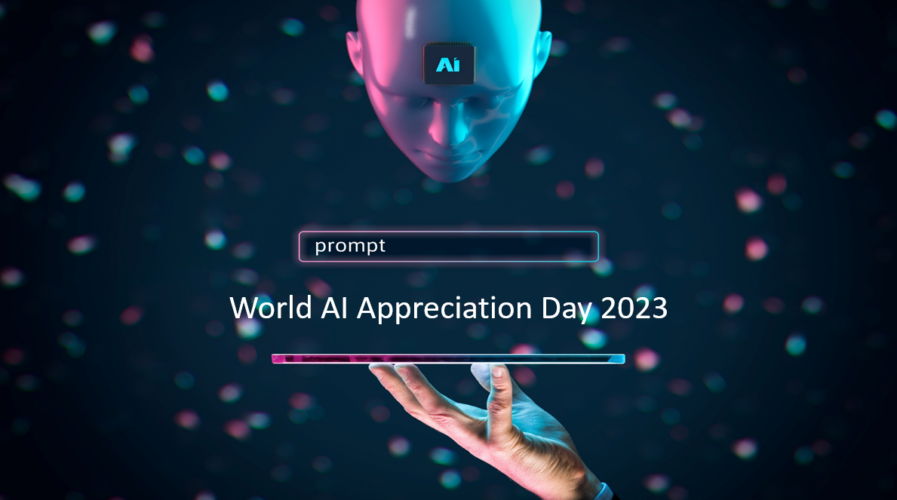
Recognize the boundless potential that lies in the future of AI. (Source – Shutterstock)
How AI is shaping our world: Reflections on World AI Appreciation Day 2023
- AI Appreciation Day 2023 highlights notable advancements in AI and the increased focus on ethics by tech giants.
- Industry leaders underscore AI’s role in enhancing data processing, cybersecurity, and cloud analysis.
As World AI Appreciation Day 2023 is celebrated around the globe, society stands on the cusp of a transformative era. The day is marked by highlighting the phenomenal strides in artificial intelligence and its vast potential for the future. Once a concept of science fiction, AI has smoothly integrated into everyday life, becoming an integral part of diverse sectors such as healthcare, finance, entertainment, and transportation. This technology, which once seemed a distant future, has revolutionized the present.
The evolution of AI over the past year has been nothing short of remarkable. A decade ago, reliable language or image recognition machines were rare. Today, these machines are adept at surpassing human abilities in many tasks. From detecting credit card fraud before it becomes a problem to evaluating eligibility for loan applications, AI systems are finding patterns and making everyday decisions.
The emergence of “generative AI”—systems capable of creating new possibilities—has been particularly noteworthy. In a few short years, this advance has significantly expanded the commercial potential of AI. This promise has not been lost on tech companies and investors who have started to pour resources into the sector.
Big names in tech, including Microsoft, Google, Amazon, and Meta Platforms, have all placed sizeable bets on generative AI. For instance, in early 2023, Microsoft invested US$10 billion in OpenAI, a leading developer of next-gen AI models, incorporating its technology into its products. Google also demonstrated its faith in the technology with a US$300 million investment in generative AI developer Anthropic while accelerating its internal development.
Also joining the AI bandwagon is Elon Musk. Despite voicing concerns on the technology earlier, Musk announced the formation of a new company focused on artificial intelligence, after months of teasing plans to build a rival to ChatGPT. The company, called xAI, will be led by Musk, according to the website, and “will work closely with X (Twitter), Tesla, and other companies to make progress towards our mission.”

Big tech giants investing heavy on generative AI. (Photo by AFP)
However, as AI’s promise unfurls, it’s crucial to stay vigilant about the associated ethical implications. The commitment to ensuring advancements in AI promote privacy, transparency, and fairness while preventing potential biases in its application must remain at the forefront of the discourse.
What are experts saying about World AI Appreciation Day 2023?
On this day, the infinite potential of AI’s future is recognized, and the pledge to harness this potential responsibly to tackle complex problems and create a more inclusive future is renewed.
In commemoration of this milestone, Tech Wire Asia reached out to experts for their insights on this transformative day. Here’s what they shared:
NetApp
The technology has progressed tremendously in the last year, with many more promises and growth opportunities on the horizon, said You Qinghong, Solutions Engineering Lead, Greater China, ASEAN and South Korea, NetApp. For instance, NetApp’s recent Cloud Complexity Report found that 56% of Asia Pacific tech executives expect half or more of their cloud deployments to be supported by AI-driven applications by 2030.
There are three broad areas where NetApp sees AI making a big contribution:
- Driving intelligence at the edge
The amount of data generated by smart edge devices and many ingestion points can overwhelm compute, storage, and networks at the edge. AI can enable edge-level analytics to process and selectively pass on data during ingest, create different tiers of data service, and speed up data movement.
- Increasing performance at the core
The network core is the heart of organizations’ AI data pipeline and demands high I/O performance. There is room for AI to be deployed to preprocess data and feed the data to the neural networks for model training, removing performance bottlenecks and accelerating AI workloads.
- Accelerating analysis in the cloud

You Qinghong, Solutions Engineering Lead, Greater China, ASEAN and South Korea, NetApp
AI and the cloud are natural bedfellows, offering an ideal environment to develop AI workflows, run proofs of concept, and form a foundation to expand on. With the right guidance, more organizations can take advantage of this synergy.
To unleash the full potential of AI, it will be essential for organizations to build a data pipeline or fabric that spans across on-premises, hosted data centers, and hyperscaler cloud, with real-time visibility and manageability. This will let organizations harness all available information in real-time and, ultimately, maximize business impact.
Cohesity

Ravi Rajendran, Vice-President, Cohesity Asia-Pacific & Japan
Ravi Rajendran, Vice-President, Cohesity Asia-Pacific & Japan, emphasized that artificial intelligence is transforming technology, the business landscape, and even society’s perceptions of the future. Yet the success of artificial intelligence adoption, the insights it provides, and the capability it offers mean nothing if the data is inaccurate or incomplete.
This is because data fuels AI algorithms, vectors, and context. Organizations need constant data to develop and deploy their AI models because, without new data, their AI models can’t continue to learn and improve their accuracy. This is why organizations that invest in collecting, storing, and analyzing high-quality data will be the winners of tomorrow because they’ll be able to leverage AI’s power for their competitive advantage.
In today’s modern and distributed IT environments and hybrid data estates, collecting, collating, and leveraging data is incredibly complex. Organizations need a modern platform that manages and secures their data, features a distributed architecture, backs up and secures their data estate, improves cyber resilience, indexes data, and offers instant data searchability. In celebrating this day, organizations should investigate the ability of a modern data management and security platform’s ability to unlock their data’s potential and maximize the power of the AI models they plan to deploy.
Veritas Technologies
According to Andy Ng, Vice President and Managing Director for Asia South and Pacific Region at Veritas Technologies, the power of AI today marks an important inflection point for the technology industry. While the true potential of Artificial intelligence is yet to be fully discovered, society can assume that its applications will be highly data-intensive, creating the need for enterprises to deploy efficient and responsible data management.
However, in today’s multi-cloud world, companies often struggle to manage the massive data deluge. Traditional data management approaches prove inadequate due to the lack of scalability, speed, and visibility. As a result, organizations are revisiting their business processes and looking to integrate this technology into their data management strategies with the promising prospect of enhancing efficiency. If done right, an organization’s AI strategy will be a regular and seamless part of its overall data management strategy.

Andy Ng, Vice President and Managing Director for Asia South and Pacific Region at Veritas Technologies
The panacea for data management in a complex, hybrid, multi-cloud environment is to deploy autonomous data management (ADM) based on artificial intelligence. For instance, with AI-driven malware scanning and anomaly detection, organizations can manage data and automate protection from cyber threats like ransomware. Artificial intelligence also enables the automation of data management processes, minimizing human intervention. This results in operational efficiencies, increased uptime, higher service levels and AI-driven insights for effective data archiving and intelligent decision-making.
The reliance on AI for data management also creates significant security risks if a proper data framework is not in place since AI-powered systems depend on large data sets. Hence, organizations must ensure the integrity of any data processes that leverage AI and take the necessary steps to defend against cyber threats by implementing robust encryption, access controls, and authentication mechanisms. Another crucial aspect is addressing biases in AI algorithms to prevent discriminatory outcomes and enhance fairness in decision-making processes. By effectively managing these security concerns and biases, organizations can unleash this technology’s potential in data management to achieve transformative business outcomes.
VMware
Darren Reid, APJ Security Business Unit Director at VMware stated that the proliferation of AI has introduced a new dimension to cyber threats, amplifying the sophistication and scale of attacks. Malicious actors increasingly manipulate AI-powered tools and techniques to launch targeted and evasive attacks that bypass traditional security measures. The rapid advancement of AI-driven attacks poses significant challenges for cybersecurity, necessitating the development of AI-powered defenses and robust countermeasures to effectively detect, mitigate, and respond to emerging cyber threats.
Training this technology to counter cyber threats presents a different set of challenges. For algorithms to be trained to tackle sophisticated AI-powered attacks, they must first learn from data sets that represent malicious behavior, which is data explicitly created to avoid detection – this process is otherwise known as adversarial learning. Moreover, it is difficult for AI to identify malicious programs with high precision as they often generate errors known as “false positives,” thus often requiring human intervention.
AI-powered network detection and response (NDR) represents a robust approach to defending networks against advanced cyber threats. By leveraging the capabilities of artificial intelligence, NDR systems can significantly enhance the speed, accuracy, and effectiveness of detecting and responding to attacks. These systems analyze vast amounts of network traffic data, identify anomalies, and detect potential threats that may typically go unnoticed by traditional security measures.
The integration of AI also enables NDR solutions to provide comprehensive data gathering from multiple security technologies and automated incident response. This automation streamlines the incident response process, allowing security teams to focus on stopping actual intrusions. AI-powered NDR tools are constantly learning and adapting to allow for the automatic detection of advanced and ever-evolving threats and automatically deliver a detailed analysis of the attack and response.
AI is not solely associated with negative aspects; it also brings numerous positive developments and advancements. While it may have resulted in more sophisticated cyber-attacks, organizations can ultimately leverage this technology to counter these attacks, to strike the right balance between cybersecurity and innovation.
Lenovo ISG

Kumar Mitra, Managing Director and Regional General Manager – CAP, Lenovo ISG (Source – LinkedIn)
Kumar Mitra, Managing Director and Regional General Manager – CAP, Lenovo ISG, stated that AI is an integral part of lives, that has revolutionized industries and transformed how people live, work, and connect. As the #1 provider of supercomputers globally, according to the TOP500 list with 168 systems worldwide, Lenovo has been instrumental in advancing AI research and applications across sectors.
Recently, Lenovo committed to invest US$1 billion in expanding infrastructure solutions, accelerating the rollout of this technology for businesses worldwide. It believes in inclusivity and ensuring widespread access to AI, empowering individuals and communities to embrace the transformative potential of this technology. Together with ISVs, partners, and customers, Mitra explained that Lenovo is nurturing this technology’s growth and building an intelligence-driven future.
Conclusion
While AI Appreciation Day reminds users of the technology, it is paramount to remember that the technology is only meant to enhance capabilities and a guidance to decision making.
READ MORE
- Safer Automation: How Sophic and Firmus Succeeded in Malaysia with MDEC’s Support
- Privilege granted, not gained: Intelligent authorization for enhanced infrastructure productivity
- Low-Code produces the Proof-of-Possibilities
- New Wearables Enable Staff to Work Faster and Safer
- Experts weigh in on Oracle’s departure from adland


